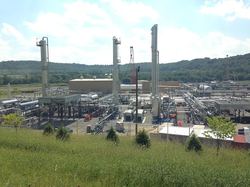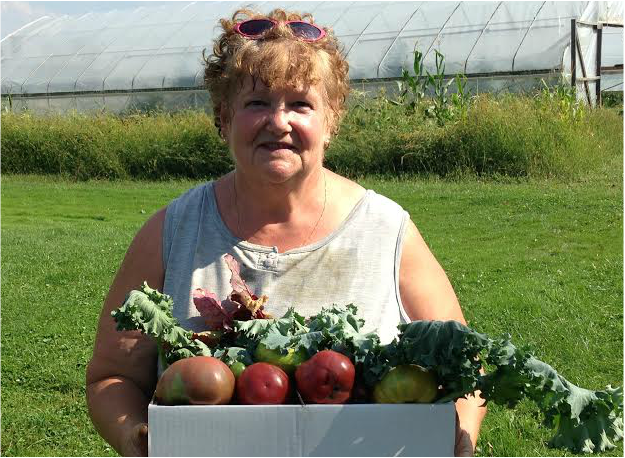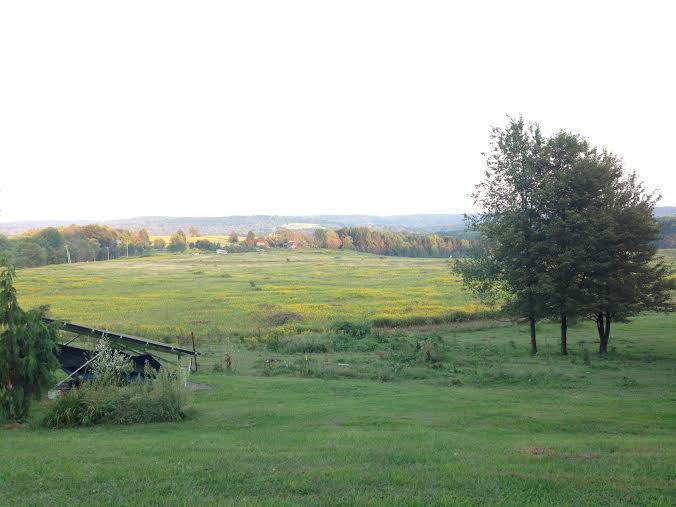
Three years ago I wrote a cover story for E Magazine about how New Yorkers were trying to keep fracking out of their state (they've succeeded so far), but since there wasn't any fracking going on there, I didn't see any.
Horizontal fracturing or fracking is the process of sending water, sand and chemicals (some of them cancer-causing) under pressure more than a mile into the earth and then horizontally into shale (or tight rock) formations, causing the rock to split and release the gas held within. The Marcellus shale extends from parts of New York through Pennsylvania, Ohio, West Virginia, and Virginia.
Pennsylvania has thousands of fracking wells. I'd been reading about how people's water was being contaminated, how endless truck traffic was wrecking roads and spreading toxic and noise pollution, how drilling infrastructure was destroying the landscape and people's peace of mind.
I spent two and a half days there, and talked to many people who say their quality of life has been ruined -- many to the degree that they're trying to sell their homes and move away.
But, unfortunately for my research, I saw very little of that myself -- just one line of trucks, no visible pollution, no noxious odors, not much noise and not much infrastructure. Or to be more accurate, I saw plenty of well pads, processing plants, compressor stations and pump stations, but they blended easily into the gorgeous green hills of that part of the country and were easy to ignore if you're not living in the middle of it. (A processing plant that separates the various elements of the valuable "wet" gas in this region into methane, ethane, and more is pictured above.)
I could see why people would lease their land for drilling, some of whom were making six figures off their investment. But I believed the folks I met who told me their lives were ruined -- by the existing conditions and by the uncertainty of not knowing what else was coming their way. I'm just sorry I didn't see more of it for myself.
There was the Presbyterian minister I interviewed whose congregation purchases hundreds of gallons of water each week to distribute to residents of the Woodlands, a mostly low income development where the water has been contaminated. It's hard to prove it's from fracking, but the water in many places has mysteriously turned bad when fracking starts.
There was the organic pig farmer, Maggie Henry (pictured at top), who sold off her stock of pigs and stopped selling vegetables at the farmers' markets because she no longer felt she could in good conscience sell her food as organic. She has a gas processing plant less than a mile from her home.
There was the couple who were planning to sell their dream home on 11 acres of woods where they'd lived for a quarter century and where they had planned to live the rest of their lives until they were surrounded by fracking wells. They'd moved from Pittsburgh to live in a quiet, peaceful place, which it no longer was. I interviewed one of them here
(starts one minute in), along with a couple who's fighting to save a beautiful local lake, and having some success.
There was the 8-year-old girl who had survived childhood leukemia, but whose skin was being burned by the water in their house, which her mother said the Department of Environmental Protection then tested and told her she should not use. She called the drilling company working in her area for help and was told they had no responsibility for her problems, and she should sue her neighbors "for being bad neighbors" because they had leased their property for gas drilling (!) Click here for a story I did for Free Speech Radio News about parents banding together to demand a buffer of one to two miles between drilling infrastructure and their kids' schools, which is often not the case now.
Everyone had stories of how the industry had lied to them -- about safety, about noise, about water and air pollution, about the amount of money they could make from leasing their land for fracking. Then there are those who think it's a wonderful bonanza of cash and cheap energy. Neighbors are divided against neighbors and even families are split pro and con.
On my way back to the Pittsburgh airport (which has agreed to allow drilling on its property to help shrink its deficit), I chatted with the van driver, who said he worked in a steel mill for 30 years before they mostly closed down. He said street lights would come on during the day because of all the air pollution, and described as "beautiful" all the flares you could see at night from the various heavy industrial processes. There was also a lot of coal mining in the area in mostly bygone days. With a history like that, it's not surprising that so many Pennsylanians take fracking in stride. Not that they should. My friend Mike, who drove me all over his part of rural paradise (below is the view from the home he and his wife built about 25 years ago) thinks opposition is building to a critical mass. Check out my stories to learn more.


 RSS Feed
RSS Feed
